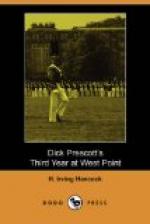“Prescotts? Lordly airs?” broke in Cadet Carter, grinning broadly. “Whew, but that would make a hit with the fellows! Why, Prescott is anything but a lordly chap. He’s one of the most modest fellows in the corps. He had to be fairly dragged on to the eleven. He believed it would be better off without him.”
“So it would, sure!” rasped the turnback.
“Now, see here, Haynes, don’t get so sore as to warp your own judgment,” expostulated Carter.
“Well, you just wait and see how much we do to the Navy! Have you heard about the Navy’s new, lightning right end?”
“Darrin, you mean?”
“Yes,” nodded Haynes. “A friend of mine, who saw Darrin play the other day, writes me that Darrin is an armor-clad terror on the grid iron. If he is, he’ll pulverize Prescott, unless Brayton shifts Prescott to some other position.”
“Pooh! I’m not afraid,” laughed Carter, turning to walk away. “Darrin, no doubt, is good, but he can’t do anything to Prescott.”
Neither of the speakers was aware that Dave Darrin, midshipman, United States Navy, was one of the oldest and dearest friends that Dick Prescott had.
Few at West Point knew that Darrin and Prescott had ever met.
“Am I going over to Philadelphia to see the game?” muttered Haynes to himself, as he strode away from the game. “I want to see Prescott go up against the real star Darrin, and get his neck broken!”
Anstey was one of the few at West Point who knew anything about the friendship between Prescott, Holmes, Darrin and Dalzell.
Dan Dalzell had also made the Annapolis eleven, playing right tackle. That was bound to bring him into hard grip with Greg.
“Anstey, I hope there’s time for you to make the acquaintance of Dave and Dan,” Dick said earnestly while the Virginian was visiting Greg and himself. “Dave and Dan are two of the real fellows, if there are any left in the world.
“They must be, old ramrod,” replied the Virginian quietly, “if they hold such place in your affections, and in old Holmesy’s.”
Great was the rejoicing, on the eventful morning, when the two “Army specials” pulled out from the station down by the river’s edge.
The first section of the train pulled out ahead, carrying the officers of the post, their families and closest friends.
On the second longer section traveled the corps of cadets—–with the exception of a few of the young men who, under discipline, were not allowed to take this trip. With the cadets went the tactical officers and the coaching force.
At Jersey City the first real stop was made. Then the journey was resumed to Philadelphia.
Franklin Field was crowded with somewhere between thirty and thirty-five thousand people when the corps of cadets, headed by the band, marched on to the field and thence to the seats reserved for the band and the corps.




